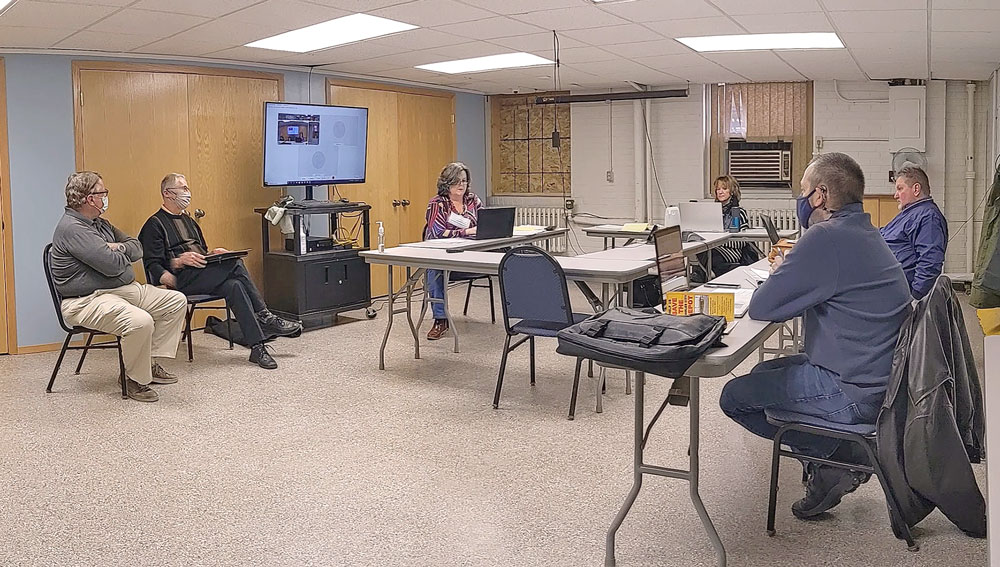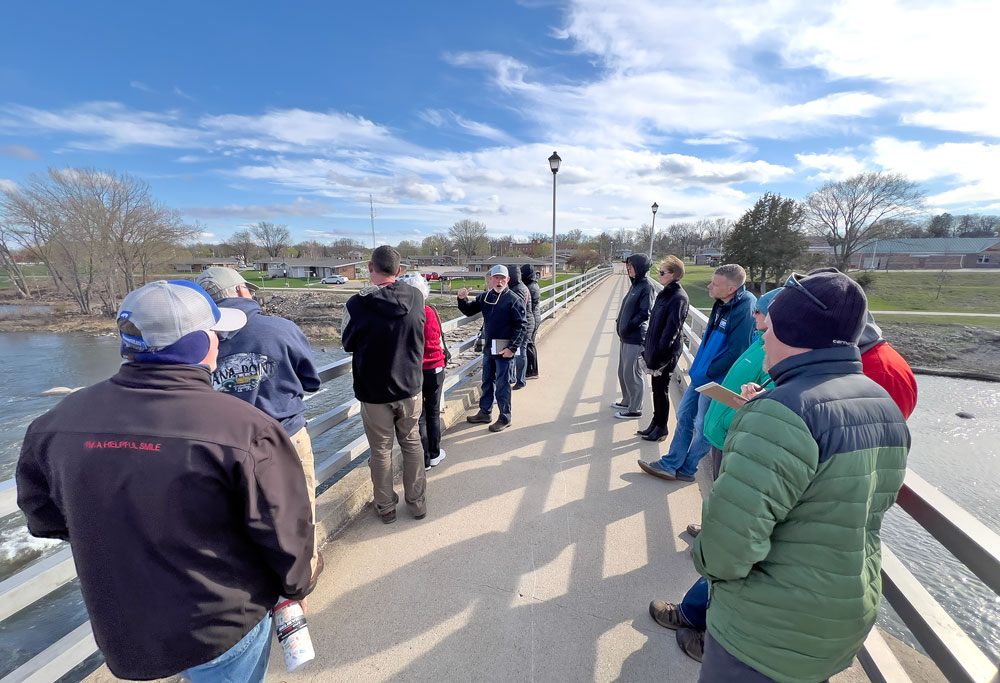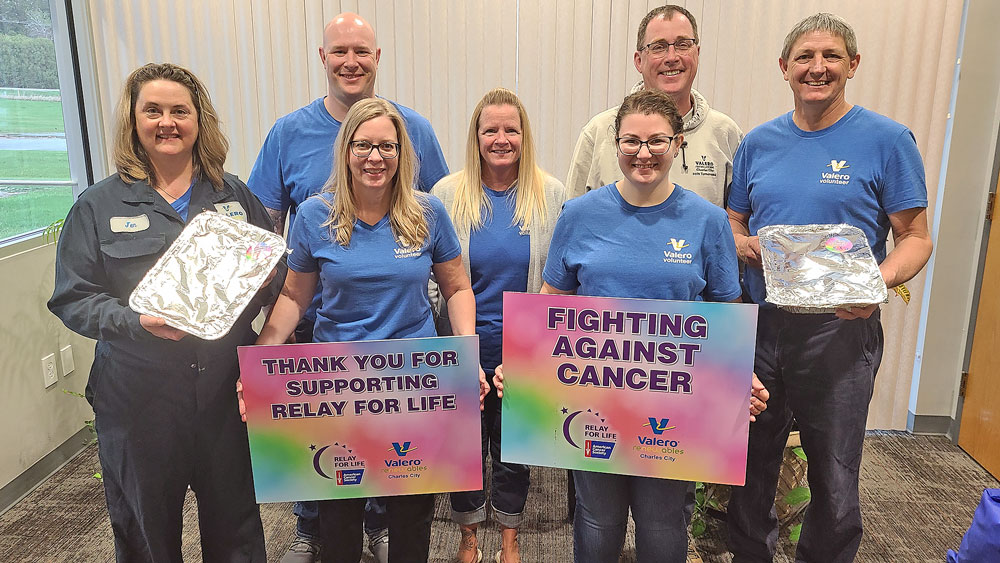Groups make big asks for Floyd County funding

Press photo by Bob Steenson
By Bob Steenson, bsteenson@charlescitypress.com
Some big projects are lining up for financial help from the county as the Board of Supervisors digs in to the budget for the next fiscal year that begins July 1.
Representatives of four groups appeared before the board at its workshop session Monday morning, making their case for additional funding next fiscal year. The groups were TLC: The Learning Center, the Floyd County Fair Society, Save the Depot and Healthy Harvest.
TLC made the biggest ask, requesting $150,000 to help support the child care center’s expansion and relocation into a wing of the former middle school building at 500 N. Grand Ave.
The Fair Society requested an additional $50,000 in funding to complete the fairgrounds renovation in the wake of the 2019 Memorial Day tornado that leveled many structures on the grounds, and the Save the Depot group asked for $25,000 for the project to help relocate and save the historic Milwaukee Road railroad depot.
The supervisors told the group representatives on Monday the same thing they tell all groups and departments making presentations at this point in the budget process — they’ll keep their requests in mind as they make the tough decisions balancing county priorities and expenditures with county income and spending capacity.
Pam Ost, director of TLC, said the child care organization’s plan to relocate to the former middle school building — hopefully to happen by September — will allow The Learning Center to expand the availability of child care in the community and enhance its economic development aspects.
Supervisors agreed on the importance of available quality child care in the community.
“TLC has been amazing — an asset not just to the families but to businesses,” said Supervisor Chairperson Linda Tjaden.
“Child care is a big part when businesses are looking at a community,” said Supervisor Doug Kamm, adding, “I have respect for you. You stayed open and set an example” during the pandemic.
Ost said TLC continued to operate during the pandemic and did not “unemploy” any staff, even though the number of children using the service dropped almost in half in the early days as families experienced layoffs and other financial hardships.
TLC even helped supply staff at Washington Elementary School for child care services provided to area essential worker families early in the pandemic.
“Our revenues were impacted drastically,” she said. A government PPP (Paycheck Protection Program) loan helped out, and the organization is in the process of qualifying to not have to repay the money.
In the past couple of months the number of children using the service has come back almost to the organization’s capacity of 93, and they continue to get calls about available space, Ost said.
The move to the school site will increase capacity to 180, she said.
Ost said the Charles City School District has already committed to spending $750,000 over the next five years for improvements and maintenance, including dividing the space the child care would use from the older part of the building that will be renovated for apartments, splitting the utilities and making sure the heating, ventilation and air-conditioning system is adequate in the TLC part of the building, and replacing the roof on the north side of the building.
TLC will seek a $550,000 low-interest loan from the U.S. Department of Agriculture to help with its share of the expenses, and it also is applying for and receiving grants and donations, but would also like help from the county, Ost said.
The Floyd County Fair Society requested an additional $50,000 in funding in the next fiscal year to complete the last new building that is being built to replace those that were destroyed in the tornado.
The money would also help with new sidewalks, landscaping and burying electrical services to go along with the work at the fairgrounds.
Finishing these projects would have the fairgrounds “back up and running” by this year’s Floyd County Fair, Fair Board President Amy Staudt said.
Staudt said that in addition to the damage from the tornado the previous year, the fair faced a fundraising challenge in 2020 because of COVID-19, and is unsure when that will change.
Two important fundraisers that were canceled — the Wine Pairing and the Spring Fling — resulted in a loss of $17,000 to $21,000, she said.
The Fair Society has also lost out so far on nine months of rental income and liquor sales income in the Youth Enrichment Center at the fairgrounds because of restrictions on public gatherings, Staudt said.
The county currently provides $10,000 in support funding for the Fair Society and pays $12,000 in rent for the county garbage and recycling site located on Packard Avenue south of the fairgrounds.
Staudt said that amount covers the cost of building, liability and dram shop insurance and the fairgrounds’ alcohol license, but more is needed to cover the costs of completing the recovery from the tornado and the loss of fundraising.
Dean Andrews and Ralph Smith made the pitch for support for the Save the Depot group, asking for $25,000 to go toward a challenge grant trying to raise enough money to move the Milwaukee Road railroad depot before its current owner, Canadian Pacific, tears it down.
The effort to save then repurpose the depot started many, many years ago, said Andrews, Charles City’s mayor, but there is some urgency now because Canadian Pacific has said it wants action before April 1.
Andrews said it’s unreasonable to expect that the depot could be moved by then, but the expectation is that if a viable plan is ready and raising the $300,000 to $350,000 required for the move is substantially complete, that the railroad company will agree to go along with the plan and might even be willing to donate what it would have cost the company to demolish the building.
Ralph Smith, a retired Charles City attorney, said his father, Jim Smith, also an attorney, remembers leaving from the depot when he and other area young men went off to fight in World War II, as well as other memories of the station.
Ralph said he asked his father if it was worth saving the depot, and when Jim said it was, Ralph laughed and said, “Put your money where your mouth is.”
Jim Smith has offered to match all grants received after October up to $100,000, Ralph Smith said. With about $166,000 already raised or pledged, raising an additional $100,000 to take full advantage of the $100,000 challenge grant would push the fundraising past the $350,000 thought to be the upper cost of the move.
Beyond that there will be significant additional costs to renovate the depot as a train history museum, community meeting space and also as a trailhead for the Charley Western trail system, Andrews said, but the first step is to save the building.
Marie Boyd, executive director of Healthy Harvest, made a request that was nowhere near the amount sought by the other groups, but still represented a sizable increase over previous funding levels.
In the current year the county gave the group dedicated to connecting people with local food sources $1,500. Boyd requested that the county increase that funding to 17 cents per capita for the population of the county, or $2,750.
She said the group has experienced a year that was very different from what it had expected, but that it had a lot of growth and increased its impact.
“A lot of people turned to local farmers when there were problems with the supply chains because of COVID,” she said.
A lot of planned in-person events had to be canceled, but the group was still able to support farmers markets including in Charles City, helped establish community gardens at Charles City Housing locations and helped source more than $25,000 in local products for students in the Charles City and 12 other school districts.







Social Share